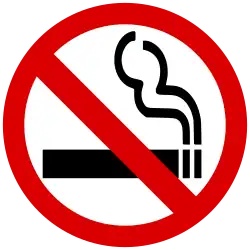English for B2 Students/Unit 10
You mustn't smoke in here
Aim of this lesson: Introduce and practice modals of deduction and use some language related to hotels and other accommodation.
Sally is a tourist and she's visiting Dublin for a few days. She has just arrived at the Victoria Hotel.
Dialogue
(listen)
| Sally | Hello, my name's Sally, and I have a room reserved for tonight. |
|---|---|
| Receptionist | Hello, Sally. Welcome to the Victoria Hotel. Can I have your passport please? |
| Sally | Here you are. |
| Receptionist | OK. It'll be €55.00 for the night. Your room number is 405 and it's on the fourth floor near the lift. |
| Sally | Great, thanks. Can someone help me with my bags, please? |
| Receptionist | Certainly. Roger, our porter, will show you to your room. |
| Next Dialogue | |
| Roger | Here's your room. Is this OK for you? |
| Sally | Yes, it looks fine. |
| Roger | There are some hotel rules which I must tell you about. Firstly, you mustn't smoke in the room and you mustn't make a lot of noise after 10pm. Also you have to vacate the room before 10am. |
| Herr Schwarz | OK, that's not a problem. Are non-guests allowed in the hotel rooms? |
| Franz | Yes, but they have to leave before 10pm. Enjoy your stay at the Victoria Hotel. Good evening. |
Grammar Focus - Modals of Obligation

Modals of obligation are used to talk about permission and prohibition.
|
English for B2 students Grammar • Unit 10
| ||||||||||||||||||||||||||||
|---|---|---|---|---|---|---|---|---|---|---|---|---|---|---|---|---|---|---|---|---|---|---|---|---|---|---|---|---|
| Modal verb | Explanation | |||||||||||||||||||||||||||
| must | obligations (often personal obligations) | |||||||||||||||||||||||||||
| mustn't | prohibited, forbidden | |||||||||||||||||||||||||||
| have to | obligations (often external obligations) | |||||||||||||||||||||||||||
| don't have to | not required, optional | |||||||||||||||||||||||||||
| should | recommended, advised | |||||||||||||||||||||||||||
| shouldn't | not recommended, not advised | |||||||||||||||||||||||||||
| ||||||||||||||||||||||||||||
| ||||||||||||||||||||||||||||
| ||||||||||||||||||||||||||||
| ||||||||||||||||||||||||||||
| ||||||||||||||||||||||||||||
Speaking about Rules
Work with a partner if possible to answer these questions.
- Does your workplace or school have many rules? What mustn't you do?
- Can you think of any rules in your local café or shop? What things must or mustn't you do?
- In some countries like Australia you have to vote in elections. Do you think this is a good idea?
Vocabulary - Hotels & Accommodation
Exercises
Try these questions to see if you can use modal verbs correctly. The answers can be found here.
Complete the following sentences using the correct modal verb:
- I'm very sorry but you mustn't / don't have to smoke here.
- Sir, you have to / must leave your passport at the reception.
- My doctor says that I shouldn't / should smoke.
- The bus was cancelled so we had to / must take a taxi.
- I mustn't / don't have to go to work on Saturday because the office is closed.
Grammar Reference
For further information about the use of modals of obligation see Modal Verb on Wikipedia.